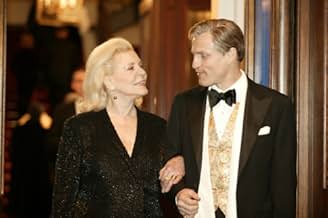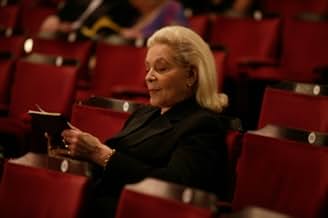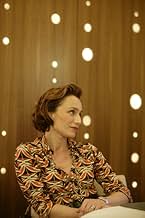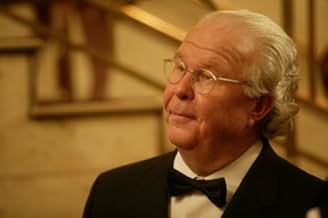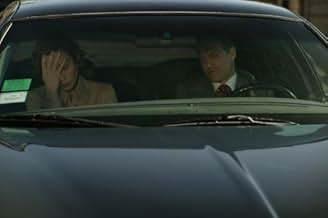VALUTAZIONE IMDb
5,8/10
6022
LA TUA VALUTAZIONE
Aggiungi una trama nella tua linguaAn escort who caters to Washington, D.C.'s society ladies becomes involved in a murder case.An escort who caters to Washington, D.C.'s society ladies becomes involved in a murder case.An escort who caters to Washington, D.C.'s society ladies becomes involved in a murder case.
- Premi
- 1 vittoria in totale
Recensioni in evidenza
To be a walker is to be something if not someone or, if you prefer, a walker is someone without being something. Whatever way you look at it, there is something that it's desperately not there. Woody Harrelson and his character, act. Acting as a way of life. Trying to be trivial all the time runs the risk of making triviality something truly important. We're standing on the sidelines looking in without seeing because if we saw, well, if we saw, things may be dramatically different. This is a film by Paul Schrader - a master in getting into the hearts and souls of the outsiders - and Harrelson is an outsider living in, with a very specific awareness. Great! A film to savor and listen to, attentively. Not very often one can actually say that. Other than Harrelson, Lauren Bacall, Kristin Scott Thomas and Lily Tomlin shine.
The Walker is about a profession many of us aren't aware of: socialites like Mr. Carter Page III, who escort ladies who happened to be the wives of senators and congressman around Washington DC and play cards and socialize (hence the 'social' part of the title). But it's also about a murder mystery, where a man is killed who is connected with Lynn Lockner, married to senator Larry Lockner. Who killed him, for what motive, and what are the connections and the fall-out of the scandal, are all a part of the narrative for Paul Schrader, the mind-games of Washington, the slick veneer and quietly accepted facts of corruption and greed and, usually, scandal. But it's also about this man, the Walker, how he is viewed by the women he is polite to (indeed his politeness is pointed out as a weakness, as "Don't be so polite" in this DC society), and his own self flagged by the legacy of his father, a hero in the eyes of many in DC. Oh, and he's gay, though this is only the ice on the cake.
For Paul Schrader, it's a mature work that shows him skillfully working out this side of DC that is fresh in perspective. He is able to write the dramatic scenes much better, however, than those of that of a thriller. One senses Schrader's investment in his own material hit high points when he just has two people in a room talking about the heart of a matter, like an argument between Carter and Emek that is really all about Carter's father but exactly about Carter the whole time, or a scene between Carter and Lauren Bacall's elder lady when he finds out a vital piece of information (the "black sheep" dialog). Scenes like those are very good, while a chase scene down an alley feels weaker, filmed with tired and repetitive dutch angles and close-ups.
So, if it isn't quite one of Schrader's best films, albeit not his worst, it is definitely an achievement for Harrelson. He disappears into the character of Carter Page III (note the III) as an effeminate but strong-willed Southern man who hides his baldness with a hair piece and keeps his politeness and calm demeanor as something that is partly natural and partly a cover for what is really deep down someone who has disappointed others around him. It's so fascinating to see this actor who, indeed, once was a co-star in White Men Can't Jump, tackle such a complex character and succeed in every scene with depth and sensitivity and subtlety. He is nothing less than totally absorbing, especially up against old pros like Bacall and Ned Beatty.
For Paul Schrader, it's a mature work that shows him skillfully working out this side of DC that is fresh in perspective. He is able to write the dramatic scenes much better, however, than those of that of a thriller. One senses Schrader's investment in his own material hit high points when he just has two people in a room talking about the heart of a matter, like an argument between Carter and Emek that is really all about Carter's father but exactly about Carter the whole time, or a scene between Carter and Lauren Bacall's elder lady when he finds out a vital piece of information (the "black sheep" dialog). Scenes like those are very good, while a chase scene down an alley feels weaker, filmed with tired and repetitive dutch angles and close-ups.
So, if it isn't quite one of Schrader's best films, albeit not his worst, it is definitely an achievement for Harrelson. He disappears into the character of Carter Page III (note the III) as an effeminate but strong-willed Southern man who hides his baldness with a hair piece and keeps his politeness and calm demeanor as something that is partly natural and partly a cover for what is really deep down someone who has disappointed others around him. It's so fascinating to see this actor who, indeed, once was a co-star in White Men Can't Jump, tackle such a complex character and succeed in every scene with depth and sensitivity and subtlety. He is nothing less than totally absorbing, especially up against old pros like Bacall and Ned Beatty.
This film is about a male escort getting involved in a murder investigation that happened in the circle of powerful men's wives.
I thought "The Walker" would be thrilling and engaging, but I was so wrong. The pacing is painfully and excruciatingly slow, that even after 40 minutes of the film nothing happens much. Seriously, the first hour could be condensed into ten minutes. That's how slow it is.
The fact that it lacks any thrills or action scenes aggravates the boredom. It's almost shocking that even argument scenes are so plain and devoid of emotion. Maybe it is because of the stiff upper lip of the higher social class?
It's sad that "The Walker" becomes such a boring mess, despite such a strong cast. Blame it on the poor plot and even worse pacing.
I thought "The Walker" would be thrilling and engaging, but I was so wrong. The pacing is painfully and excruciatingly slow, that even after 40 minutes of the film nothing happens much. Seriously, the first hour could be condensed into ten minutes. That's how slow it is.
The fact that it lacks any thrills or action scenes aggravates the boredom. It's almost shocking that even argument scenes are so plain and devoid of emotion. Maybe it is because of the stiff upper lip of the higher social class?
It's sad that "The Walker" becomes such a boring mess, despite such a strong cast. Blame it on the poor plot and even worse pacing.
"Whoever has looked deeply into the world might well guess what wisdom lies in the superficiality of men," is a quotation attributed to Nietzsche. The first half of The Walker could be said to demonstrate such a principle, particularly the mien of its chief protagonist, Carter Page III (flawlessly played by Woody Harrelson). Yet the second half would give that observation an altogether more cynical meaning. One appropriate to the very men that Page despises.
Page exhibits the exquisite superficiality ("I'm not naïve: I'm superficial") so often associated with camp intellectuals (as well as a capacity for self-adulation). We first meet him during an opening panning shot that examines the luxurious wall fabrics in the room where several voices can be heard. Wall furnishings are something that Page III can associate with. Both in a literal aesthetic sense, and also as a man that is walled in by the societal prejudices against his homosexuality. One step removed from the visceral world of those who can openly admit their true feelings, Page III examines the details of everyday life with dispassion and critical elegance. But when his friend Lynn Lockner (wife of a liberal senator) discovers a murder, he is torn between two paths, both equally morally repugnant.
While not quite a saint, Page III has a much higher sense of decency than the political connivers and sexually bigoted people that surround him. These people use superficial appearances to make money, win office, or rise at any cost. Their 'wisdom' is simply that of the top dog having torn and bloodied anyone who stood in their way.
Bacall, instantly recognisable by her charismatic voice, is the perfect foil for Page's charm and mendacity. Quick-witted, she reminds us of her early characters in films like To Have and Have Not and Key Largo. "You were just a young slip of a girl, not the beautiful woman you are now," says Page. "Cut the sh*t!" she replies, without for a minute losing her majestic gravitas.
Page is a 'Walker' although working one day a week in a real estate office, his main income is comes from when he "walks rich women from place to place." The term was coined for Jerry Zipkin, who was Nancy Reagan's 'walker'. His duties include amusing gossip, taking Lynn to the opera and a weekly game of canasta. Immaculately dressed and coiffured, he inhabits the world of the unostentatiously rich without ever becoming a main player. His father was a respected governor and his father before him a successful businessman ("My grandfather always talked like a man with a bible half-open in his head."). He is gay, and therefore not a threat. And he is well-read, well-bred, and a delightful conversationalist.
Yet although Harrelson stars in every scene, The Walker succeeds very much as an ensemble piece. Bacall and Kristin Scott Thomas have a fair share of excellent lines. "Memory is a very unreliable organ," says Bacall: "It's right up there with the penis." Kristin Scott Thomas also gives Page a fair run for his money. When he says dismissively in a conversation that, "it's just sex," she retorts with, "And that stuff you're breathing is just oxygen!" Page has an unlikely lover in the form of Emek Yoglu, a German-Turkish artist whose photography is too politically loaded for Page's tastes. But the main man in Page's life is his dead father, who symbolises both the success Page III has never achieved and perhaps moral double-standards that he loathes. Yet at the same time Page himself leads a life a double-life, not out of choice but because it is forced on him.
Writer/director Paul Schrader picked Washington DC as the setting for the film because of "the deep hypocrisy of the town, Washington and Salt lake City are two of the last cities in America where sexual hypocrisy is mandated, and here is a character living a false and superficial life, so it seemed an ideal place for it." It is one of Schrader's best scripts (apart from a few unlikely coincidences to move the plot along) and the performances are perfect. The lush cinematography sucks us into the world of the rich and stylish (with Bryan Ferry songs to assure us it's OK) so that 'reality' in the form of murder most foul is all the more unsettling. Only as the authorities brazenly attempt to implicate Page do some of his hairs come out of place. "This is a mean crowd, this administration," he admits falteringly. (Lynn calls them 'the cave dwellers'). They can't catch him for what he hasn't done so they'll find something else. "It's perjury that catches people out," the investigator says to him (with shades of Clinton witch-hunting).
The loner-whose-world-crumbles-around him is a favourite premise for Schrader and the subtle political complexities are home territory for Harrelson, who is no stranger to such themes in films such as North Country, Wag the Dog, Welcome to Sarajevo and The People vs. Larry Flynt. But the film's weakness is its constant subtlety. We are expected to be fascinated by the undercurrents, the hidden cards so much so that some audiences may switch off. The Walker is clever and perfectly executed but, like its subject matter, is a superficial observer of the dilemmas it grapples with at arm's length.
Perhaps such prominence of aesthetics over substance is the way to provoke discussion of the problems dealt with so obtusely. "I think film is a great medium to be able to discuss such issues," says Kristin Scott Thomas. "Although politics changes very rapidly, it also repeats itself over and over in a different context. When you see films that are making a comment about the political situation of a certain time and then you see another film thirty years later and you have the same kind of issue, it creates discussion and that is very important."
Page exhibits the exquisite superficiality ("I'm not naïve: I'm superficial") so often associated with camp intellectuals (as well as a capacity for self-adulation). We first meet him during an opening panning shot that examines the luxurious wall fabrics in the room where several voices can be heard. Wall furnishings are something that Page III can associate with. Both in a literal aesthetic sense, and also as a man that is walled in by the societal prejudices against his homosexuality. One step removed from the visceral world of those who can openly admit their true feelings, Page III examines the details of everyday life with dispassion and critical elegance. But when his friend Lynn Lockner (wife of a liberal senator) discovers a murder, he is torn between two paths, both equally morally repugnant.
While not quite a saint, Page III has a much higher sense of decency than the political connivers and sexually bigoted people that surround him. These people use superficial appearances to make money, win office, or rise at any cost. Their 'wisdom' is simply that of the top dog having torn and bloodied anyone who stood in their way.
Bacall, instantly recognisable by her charismatic voice, is the perfect foil for Page's charm and mendacity. Quick-witted, she reminds us of her early characters in films like To Have and Have Not and Key Largo. "You were just a young slip of a girl, not the beautiful woman you are now," says Page. "Cut the sh*t!" she replies, without for a minute losing her majestic gravitas.
Page is a 'Walker' although working one day a week in a real estate office, his main income is comes from when he "walks rich women from place to place." The term was coined for Jerry Zipkin, who was Nancy Reagan's 'walker'. His duties include amusing gossip, taking Lynn to the opera and a weekly game of canasta. Immaculately dressed and coiffured, he inhabits the world of the unostentatiously rich without ever becoming a main player. His father was a respected governor and his father before him a successful businessman ("My grandfather always talked like a man with a bible half-open in his head."). He is gay, and therefore not a threat. And he is well-read, well-bred, and a delightful conversationalist.
Yet although Harrelson stars in every scene, The Walker succeeds very much as an ensemble piece. Bacall and Kristin Scott Thomas have a fair share of excellent lines. "Memory is a very unreliable organ," says Bacall: "It's right up there with the penis." Kristin Scott Thomas also gives Page a fair run for his money. When he says dismissively in a conversation that, "it's just sex," she retorts with, "And that stuff you're breathing is just oxygen!" Page has an unlikely lover in the form of Emek Yoglu, a German-Turkish artist whose photography is too politically loaded for Page's tastes. But the main man in Page's life is his dead father, who symbolises both the success Page III has never achieved and perhaps moral double-standards that he loathes. Yet at the same time Page himself leads a life a double-life, not out of choice but because it is forced on him.
Writer/director Paul Schrader picked Washington DC as the setting for the film because of "the deep hypocrisy of the town, Washington and Salt lake City are two of the last cities in America where sexual hypocrisy is mandated, and here is a character living a false and superficial life, so it seemed an ideal place for it." It is one of Schrader's best scripts (apart from a few unlikely coincidences to move the plot along) and the performances are perfect. The lush cinematography sucks us into the world of the rich and stylish (with Bryan Ferry songs to assure us it's OK) so that 'reality' in the form of murder most foul is all the more unsettling. Only as the authorities brazenly attempt to implicate Page do some of his hairs come out of place. "This is a mean crowd, this administration," he admits falteringly. (Lynn calls them 'the cave dwellers'). They can't catch him for what he hasn't done so they'll find something else. "It's perjury that catches people out," the investigator says to him (with shades of Clinton witch-hunting).
The loner-whose-world-crumbles-around him is a favourite premise for Schrader and the subtle political complexities are home territory for Harrelson, who is no stranger to such themes in films such as North Country, Wag the Dog, Welcome to Sarajevo and The People vs. Larry Flynt. But the film's weakness is its constant subtlety. We are expected to be fascinated by the undercurrents, the hidden cards so much so that some audiences may switch off. The Walker is clever and perfectly executed but, like its subject matter, is a superficial observer of the dilemmas it grapples with at arm's length.
Perhaps such prominence of aesthetics over substance is the way to provoke discussion of the problems dealt with so obtusely. "I think film is a great medium to be able to discuss such issues," says Kristin Scott Thomas. "Although politics changes very rapidly, it also repeats itself over and over in a different context. When you see films that are making a comment about the political situation of a certain time and then you see another film thirty years later and you have the same kind of issue, it creates discussion and that is very important."
THE WALKER is an extremely biting, well written, dark suspense thriller by Paul Schrader with a knock out cast of actors that blend right into their nasty characters with humor and a killing sense of themselves and their self worth. As one character points out, "it's always about the money", and in THE WALKER, I would say that it is ALWAYS about POWER and the perception of what people think of you and the power you hold.
Woody Harrelson is simply terrific in his role of "Walker", and you are reminded of Truman Capote and the attention he gave to society women to propel his importance of being a "gossip monger". The film also brings to the surface the superficiality of "nail a star, be a star", and the underlying elements of what it takes to make it in Washington politics. THE WALKER, like CAPOTE and INFAMOUS, leaves you with a desire to find a life built on something more than being famous and well known and for Woody Harrelson, to create a relationship built upon the honesty of his sexuality.
Woody Harrelson is simply terrific in his role of "Walker", and you are reminded of Truman Capote and the attention he gave to society women to propel his importance of being a "gossip monger". The film also brings to the surface the superficiality of "nail a star, be a star", and the underlying elements of what it takes to make it in Washington politics. THE WALKER, like CAPOTE and INFAMOUS, leaves you with a desire to find a life built on something more than being famous and well known and for Woody Harrelson, to create a relationship built upon the honesty of his sexuality.
Lo sapevi?
- QuizWriter and Director Paul Schrader told HX Magazine that Woody Harrelson refused to do any publicity for this movie because he was dissatisfied with his own performance in it.
- BlooperThe second time Woody Harrelson's character is interrogated by the police, he has a gold waistcoat on. However, when he leaves the building the waistcoat had disappeared.
- Citazioni
Natalie Van Miter: Memory is a very unreliable organ. Trust me Car, it's right up there with the penis.
- Colonne sonoreWhich Way to Turn
Performed by Bryan Ferry
Written by Bryan Ferry
Published by EMI Publishing Ltd
Licensed Courtesy of Virgin Records Ltd
I più visti
Accedi per valutare e creare un elenco di titoli salvati per ottenere consigli personalizzati
Dettagli
Botteghino
- Budget
- 10.000.000 USD (previsto)
- Lordo Stati Uniti e Canada
- 79.698 USD
- Fine settimana di apertura Stati Uniti e Canada
- 16.525 USD
- 9 dic 2007
- Lordo in tutto il mondo
- 590.416 USD
- Tempo di esecuzione
- 1h 48min(108 min)
- Colore
- Mix di suoni
- Proporzioni
- 2.35 : 1
Contribuisci a questa pagina
Suggerisci una modifica o aggiungi i contenuti mancanti






